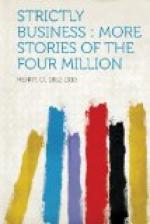But this is heresy, and not poesy. We woo the sweet nymph Algebra; we would conduct you into the presence of the elusive, seductive, pursued, satisfying, mysterious X.
Not long before the beginning of this century, Septimus Kinsolving, an old New Yorker, invented an idea. He originated the discovery that bread is made from flour and not from wheat futures. Perceiving that the flour crop was short, and that the Stock Exchange was having no perceptible effect on the growing wheat, Mr. Kinsolving cornered the flour market.
The result was that when you or my landlady (before the war she never had to turn her hand to anything; Southerners accommodated) bought a five-cent loaf of bread you laid down an additional two cents, which went to Mr. Kinsolving as a testimonial to his perspicacity.
A second result was that Mr. Kinsolving quit the game with $2,000,000 prof—er—rake-off.
Mr. Kinsolving’s son Dan was at college when the mathematical experiment in breadstuffs was made. Dan came home during vacation, and found the old gentleman in a red dressing-gown reading “Little Dorrit” on the porch of his estimable red brick mansion in Washington Square. He had retired from business with enough extra two-cent pieces from bread buyers to reach, if laid side by side, fifteen times around the earth and lap as far as the public debt of Paraguay.
Dan shook hands with his father, and hurried over to Greenwich Village to see his old high-school friend, Kenwitz. Dan had always admired Kenwitz. Kenwitz was pale, curly-haired, intense, serious, mathematical, studious, altruistic, socialistic, and the natural foe of oligarchies. Kenwitz had foregone college, and was learning watch-making in his father’s jewelry store. Dan was smiling, jovial, easy-tempered and tolerant alike of kings and ragpickers. The two foregathered joyously, being opposites. And then Dan went back to college, and Kenwitz to his mainsprings—and to his private library in the rear of the jewelry shop.
Four years later Dan came back to Washington Square with the accumulations of B. A. and two years of Europe thick upon him. He took a filial look at Septimus Kinsolving’s elaborate tombstone in Greenwood and a tedious excursion through typewritten documents with the family lawyer; and then, feeling himself a lonely and hopeless millionaire, hurried down to the old jewelry store across Sixth Avenue.
Kenwitz unscrewed a magnifying glass from his eye, routed out his parent from a dingy rear room, and abandoned the interior of watches for outdoors. He went with Dan, and they sat on a bench in Washington Square. Dan had not changed much; he was stalwart, and had a dignity that was inclined to relax into a grin. Kenwitz was more serious, more intense, more learned, philosophical and socialistic.




